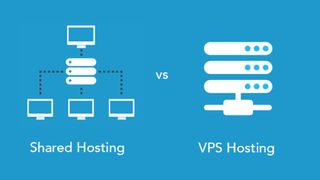
Whether you’re providing a product or a service, maintaining a web presence is a critical component of modern business.
And in the current landscape where threats are seemingly everywhere, web hosting security is key to ensuring you don’t suffer an online attack that compromises your customers’ details - and ruins your brand reputation.
Naturally, not all hosting providers are created equal. Moreover, there are different types of hosting services for different needs. In this article, we’ll be taking a look at exactly what you need to do when choosing a web host that’s right for you in terms of the security it offers.
- Here is a list of the best web hosting services available
- Check out our list of the best website builders on the market
- Also, we've created a list of the best anonymous hosting services right now
Types of web hosting services
Web hosting services take many forms, but there are four that stand out:
Are you a pro? Subscribe to our newsletter
Sign up to the TechRadar Pro newsletter to get all the top news, opinion, features and guidance your business needs to succeed!
Shared hosting
Shared hosting is the most basic form of web hosting available. It’s highly cost-effective and suitable for basic websites that aren’t engaged in e-commerce.
Resources are shared by multiple websites on a single server. This is the primary reason why costs are low. Each site hosted on the server will be awarded a limited number of resources based on the hosting plan.
If you expect your website to attract heavy traffic, this isn’t the best option for you. If another site also experiences a traffic spike, you’ll end up with performance issues and maybe even some downtime.
Shared hosting is better suited for beginners, bloggers, or any non-retail website that doesn’t attract large volumes of traffic.

VPS hosting
Those who sign up for a VPS Hosting plan still share a single server with other customers - but not as much as on a shared hosting plan. In fact, you’ll share the server with a significantly lower number of websites (lowering your exposure to risk).
VPS hosting describes the process where the primary server is split into several virtual servers. These can be customized to the specific needs of the website and the business.
VPS hosting is fairly secure but it depends entirely on the software on which it is running.
Dedicated hosting
Dedicated hosting provides a dedicated server for your website. With this hosting model, you don’t share anything with other customers.
As no resources will be shared, this is the most expensive type of web hosting available. However, it comes with added benefits like peak performance, complete technical control over server settings, and more. It’s best suited for large businesses that attract more than 100,000 visitors a month.
A dedicated host is one of the most secure types of web hosts you can use. However, it’s still vulnerable to online attacks, which means you need to do all your can to keep it secure, such as using trusted networks only and keeping it up-to-date.

Cloud hosting
Cloud hosting is similar to VPS hosting but on a larger scale. It’s highly cost-effective and enables access to multiple remote servers.
Each server is assigned a different set of responsibilities, so whenever one is compromised, the others will take over. This means that you won’t have to deal with any unexpected downtime due to cyberattacks or server errors.
Cloud hosting is also highly scalable. You can scale your resources on-demand depending on your present needs.
How secure is cloud hosting? It is the most secure type of web host you can get, thanks to the fact that it uses encryption technology and, moreover, cloud hosting companies are known for employing sophisticated security measures to keep your data safe.
Managed vs. unmanaged hosting
Before committing, it’s essential to know the difference between managed and unmanaged hosting because one demands significant technical skills while the other doesn’t.
Managed hosting
Managed hosting services help you “manage” the server where your sensitive data is stored. They do all the grunt work for you so that you can focus on your business. This could be anything from maintenance to upgrades and even repairs.
Furthermore, in addition to Linux or Windows server operating systems, the managed hosting service provider will install and maintain all the necessary software and Content Management Systems (CMS).
All you have to do is click a button to access and install hundreds of modules through a user-friendly cPanel. You also have access to features like automatic backup protocols, real-time monitoring, security sweeps, and threat alerts.
Unmanaged Hosting
Unmanaged hosting comes with a very limited number of services. Most often, you just receive server space with the operating system.
If you don’t have the required technical skills for unmanaged hosting, you’re going to get stuck quickly. You’ll need to install and manage specific software without any support from the hosting service provider.
Whenever there’s a problem, it’ll be your responsibility to take care of it. If you don’t have highly technically skilled individuals in-house, unmanaged hosting isn’t for you.
Once you decide on the type of hosting, it’s time to start vetting
Before you make a final decision, let’s take a look at all the other important variables that will impact your website in the long term.
What’s their uptime?
Time is money, so every second longer your site takes to load can equal significant losses. This is especially true for e-commerce platforms as delays can lead to missed sales opportunities - and damage to brand value.
For example, the infamous Amazon Web Services outage caused by human error cost businesses more than $150 million over three hours.
On the plus side, most hosting service providers guarantee a certain amount of uptime. Whenever there’s an unplanned outage (and there will be), they will reimburse you based on your Service-Level Agreement (SLA). These grantees usually range from 99% to a 99.9% uptime threshold.
What’s the load time/speed?
Load time can sound the same as uptime. The difference is that uptime refers to the amount of time your website is live and available to customers, while load time refers to the amount of time your pages take to load.
And after you’ve put in all the work to build a beautiful and responsive website, the last thing you want to do is annoy visitors with slow load times.
Look for hosting reviews with actual server speed tests and look at specific features that ensure fast-loading websites.
Security and data breach record
If your potential hosting service provider has a history of data leaks and breaches, it’s not for you.
Also, be on the lookout for subdomain takeovers where hackers took over subdomains with the help of some external services. These types of attacks are hard to trace, but not impossible.
Some hosting service providers and e-commerce platforms like Squarespace and Shopify, for example, are known not to handle the subdomain ownership verification correctly. However, once your site is live, you can leverage an asset monitoring tool to avert hostile takeovers.
If you’re hosting a WordPress website, know that some plugins can leak information. Security researchers have in the past identified plugs that have put hundreds of thousands of WP sites at risk.
Customer service and support
Customer service and support are important, especially when you’re dealing with hosting issues.
If you’ve signed up with a managed service provider, you need to be sure that they’re available 24/7, all year around. This is especially vital when you’re under attack from threat actors.
Web hosting security checklist:
Understand the difference between hosting models before choosing
Do your own research, and be thorough
Read reviews extensively
Check the provider’s uptime record
Check their loading time and speed
Check what security protocols are in place
Did they experience a data breach?
What about hostile subdomain takeovers?
Lookout for pricing tricks
Check their customer service and support record
Be thorough with SLA agreements before signing them
Conclusion
Before choosing a web hosting plan, you need to look at all the different variables that ensure security, scalability, and business relevance.
The right choice for you depends on your business model, target audience, your own personal technical prowess, and long-term business goals. Just ask yourself, “what do we need right now? What’s our budget and which hosting plan will help us achieve our security goals?”
Whatever you do, though - don’t sell yourself short. If a plan is too risky, always consider spending a little extra for more peace of mind.
- Here is a list of the best cheap web hosting deals and services right now
Jerry Low is the founder of WebRevenue.io and a geek dad with years of experience in SEO and web hosting business.
Most Popular

